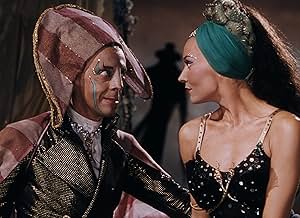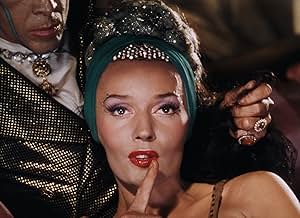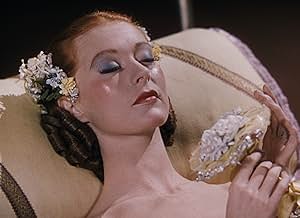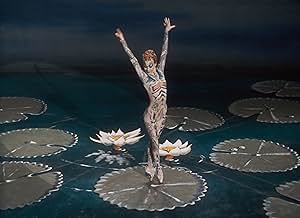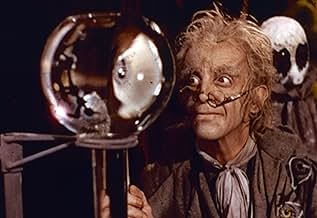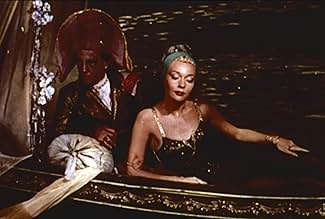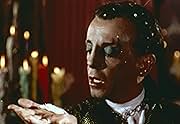Adicionar um enredo no seu idiomaA melancholy poet reflects on three women he loved and lost in the past: a mechanical performing doll, a Venetian courtesan, and the consumptive daughter of a celebrated composer.A melancholy poet reflects on three women he loved and lost in the past: a mechanical performing doll, a Venetian courtesan, and the consumptive daughter of a celebrated composer.A melancholy poet reflects on three women he loved and lost in the past: a mechanical performing doll, a Venetian courtesan, and the consumptive daughter of a celebrated composer.
- Direção
- Roteiristas
- Artistas
- Indicado a 2 Oscars
- 2 vitórias e 3 indicações no total
- Giulietta
- (as Ludmilla Tcherina)
- …
- Spalanzani
- (as Leonide Massine)
- …
- Olympia
- (canto)
- …
- Giulietta
- (canto)
- …
- Nicklaus
- (canto)
- …
- Spalanzani
- (canto)
- …
Avaliações em destaque
With the audacity that Powell & Pressburger were famous for we are presented with a wonderful performance of a truly "composed" film. All the soundtrack was recorded by Sir Thomas Beecham and the Royal Philharmonic Orchestra and then the filming was all done on the open stage (it didn't need a sound stage) at Shepperton.
With choreography by Sir Frederick Ashton and performances by ballet luminaries such as Moira Shearer, Ludmilla Tchérina, Robert Helpmann, Léonide Massine and Sir Frederick Ashton himself. Assisted by opera stars such as Robert Rounseville and Anne Ayars and the Sadler's Wells Chorus. All this backed by the designs of Hein Heckroth and the experienced team of technicians that worked regularly under the banner of The Archers leads to a treat to behold.
The plot - from a 1951 (year of release) programme.
The Prologue : The Opera House in Nurnberg (Nüemburg). Hoffmann sits in the auditorium watching a performance of the Dragonfly ballet. He is in love with Stella, the prima ballerina, who seems the embodiment of all his past loves. In the interval Hoffmann goes to Luther's Tavern. Here young students greet him. He sings them the ballad of Kleinzack. But the sight of Stella has reopened old wounds. "Would YOU hear the three tales of my folly of love?" lie asks. The students gather round the punch bowl, with Hoffmann's companion, Nicklaus, who has accompanied him throughout his adventures, and his enemy Lindorf.
The Tale Of Olympia : As an inexperienced student in Paris, Hoffmann was tricked by two puppet-makers, Spalanzani and Coppelius, into falling in love with their latest creation, the doll Olympia. Spalanzani passes Olympia off as his daughter and hopes by this means to get some money from Hoffmann. At a ball given for her, Olympia sings the "Doll Song" and dances a ballet. Hoffmann is entranced. Only when Spalanzani and Coppelius fall out, and Coppelius destroys the doll in revenge does Hoffmann realise how he was fooled.
The Tale Of Giulietta : As a young man of the world, he was enslaved by a beautiful Venetian courtesan, Giulietta. Acting under the influence of the magician Dapertutto, Giulietta captures his reflection and so gains possession of his soul. Hoffmann kills her former lover Schlemil in a duel, to get the key to her room. He hurries back to her, but finds she has left with Dapertutto. Mad with rage, he flings the key against her mirror. It cracks, and his reflection reappears. He has regained his soul.
The Tale Of Antonia : As a mature artist and poet, Hoffmann falls in love with Antonia. Her mother, a singer, has already died of consumption (Tuberculosis). Crespel, her father, through grief at his wife's death, is now the half-mad wreck of a formerly great conductor. Crespel keeps his daughter in seclusion on an island in the Greek Archipelago and forbids her to aggravate her own weakness by singing. He also forbids his deaf servant Franz to admit either Hoffmann or the quack Dr. Miracle who killed his wife. Franz misunderstands, and in turn shows them in. Hoffmann realises Antonia is ill, and she promises him not to sing again. Dr. Miracle persuades her it is her mother's wish she should disobey. She does so, and dies in his arms.
The Epilogue : On the stage of the Opera House, it is the finale of the Stella Ballet. In the tavern Hoffmann's audience is spellbound. Hoffmann's tales are told and with the telling Hoffmann finds his true destiny as a poet. Stella appears at the door of the tavern and looks down at him. But Lindorf, who has also understood the meaning of the Tales goes to meet her and together they pass out into the town.
In the story a poet Hoffman tells in episodic fashion about the many times that he has loved and lost. There have been several films made with such a theme but Hoffman stands well apart because of the Goth-fantastic nature of the narratives. Hoffman, in turn, falls in love with Olympia - a puppet, Guiletta - the temptress of a soul-stealing demon, and Antonia - a singer doomed by fatal consumptive illness.
This narrative is complemented by the brilliantly supportive artistic design of the film. The makers construct a deliberate stage-like ambiance, with the use of representative backdrops, suitably exaggerated props and striking motifs to convey the settings and moods of the various episodes. In this aspect it shares strong kinship with Masaki Kobayashi's period ghost story anthology Kwaidan. You also have the concept of the same actor returning to play different parts in the various episodes of Hoffman's life, the most notable of which is Robert Helpmann who portrays the sinister element in all the episodes (and with his vampiric menacing look, does a terrific job of it, although his motive for evil in the Antonia episode goes unexplained).
The fantastic elements of the plot, color-drenched distinctive look, intricate balletic choreography and excellent fit of all the actors in their roles make Tales of Hoffman a very interesting watching experience on the whole.
One of my caveats with the film is that Hoffman's companion Nicklaus is never properly explained. Who is this woman in man's garb and why is she doing what she does?
However, unlike THE RED SHOES, HOFMMAN is a much colder experience. For a film about the joys and sufferings of love and desire, the whole thing is quite remote, never reaching the emotional depth of other Powell and Pressburger films. The whole thing feels overlong and if you aren't an opera fan, you aren't likely to take to the music either.
The three sequences which make up the runtime are uneven: the Olympia story is whimsical and fun though a touch overlong; the Giuletta sequence is gothic and well-paced; the Antonia sequence is just about the worst. Olympia and Giuletta benefit from having charismatic performers at their center in Moira Shearer and Ludmilla Tcherina, but Ann Ayars lacks any real personality as the dying songstress, making the last section such a drag to sit through.
By the time the film came to its close, I was more than ready for it to be done with. No doubt, a lot went into the sets, costumes, special effects, and camera work. I must also give a shout-out to Robert Rounseville as Hoffman: he carries himself well throughout the long running time. But I'm sorry to be the naysayer: when a movie is over two hours long, I need more than gorgeous visuals to see me through it.
The story begins in Nuremberg as Hoffmann watches the object of his affections, Stella (Moira Shearer) dance a ballet. During the intermission, he goes into a tavern and tells the customers about his three major affairs.
Opera singers, with two exceptions, dub the stars, who are mostly from the ballet world; several will be familiar from The Red Shoes: Moira Shearer, Ludmilla Tcherina, Robert Helpmann, Léonide Massine, and Frederick Ashton. Only Hoffmann, Robert Rounsville, and Antonia, Anne Ayars, do their own singing. The rest of the vocals are provided by Dorothy Bond, Margherita Grandi, Monica Sinclair, Joan Alexander, Grahame Clifford, Bruce Dargavel, Murray Dickie, Owen Brannigan, Fisher Morgan, and Rene Soames.
Both the singing and dancing are absolutely magnificent, the beautiful Shearer dancing much better than she did in The Red Shoes several years earlier, and Powell and Pressburger fill the opera with fantastic effects and colors. My favorite is Shearer's doll ballet sequence, with the glorious coloratura singing of the Doll Aria by Dorothy Bond, a discovery of Sir Thomas Beecham, who conducts the orchestra. Tragically she was killed in a car accident the next year; she deserved to be one of the most famous sopranos who ever lived.
There are a couple of problems with this incredible piece. It's done in English, which due to the tamber of the high soprano voice, can make it difficult to understand. So people who know the opera would probably enjoy it the most. Secondly, it's not paced very well - there are some very draggy sections; some of the chorus work could have been cut.
The overall effect for the eyes and ears is fabulous, but "The Tales of Hoffmann" leaves one depressed for how far we've fallen culturally in this world. Imagine mounting this film today. How many people would attend? Five?
Você sabia?
- CuriosidadesGeorge A. Romero, writer/director of A Noite dos Mortos-Vivos (1968) and Zombie - O Despertar dos Mortos (1978) has cited this as his all-time favorite movie, saying that it was the one that originally inspired him to get into filmmaking.
- Erros de gravaçãoGiulietta's necklace is turned from jewels to wax by Dapertutto, however, in a longer shot, it is briefly shown as jewels again, before a close-up, where it is wax again until Dapertutto changes it back to jewels.
- Citações
Chorus of Students: Some drink, drink, drink, drink, drink: do you hear us about? You lazy lout! We want some beer; we want some wine! Pour out the wine, and drink and drink till morning. Pour out the wine for drinking is divine. It is divine. We want some beer; we want some wine. We want some beer; we want some wine.
- Cenas durante ou pós-créditosIn the end credits, main actors appear taking curtain calls next to the singers who dubbed them.
- Versões alternativasThe complete 138-minute version was available in 16mm black and white early television prints. The complete 138-minute version was also available in 16mm Kodachrome (color) rental prints. The complete 138-minute soundtrack was available for many years on LP (London Records).
- ConexõesFeatured in The Late Show: Michael Powell (1992)
- Trilhas sonorasThe Tales of Hoffmann, A Fantastic Opera
Music by Jacques Offenbach
Arranged by Thomas Beecham (uncredited)
English libretto by Dennis Arundell
From the French text by Jules Barbier
Conductor: Thomas Beecham (as Sir Thomas Beecham Bart.) with The Royal Philharmonic Orchestra
Sung by Robert Rounseville, Dorothy Bond, Margherita Grandi, Ann Ayars (as Ann Ayars), Monica Sinclair, Joan Alexander, Grahame Clifford, Bruce Dargavel, Murray Dickie, Owen Brannigan, Fisher Morgan, Rene Soames, and The Sadler's Wells Chorus
Principais escolhas
Detalhes
- Data de lançamento
- País de origem
- Idioma
- Também conhecido como
- Contos de Hoffman
- Locações de filme
- Empresas de produção
- Consulte mais créditos da empresa na IMDbPro
Bilheteria
- Faturamento bruto nos EUA e Canadá
- US$ 91.930
- Fim de semana de estreia nos EUA e Canadá
- US$ 23.340
- 15 de mar. de 2015
- Faturamento bruto mundial
- US$ 140.714
- Tempo de duração
- 2 h 13 min(133 min)
- Proporção
- 1.37 : 1



